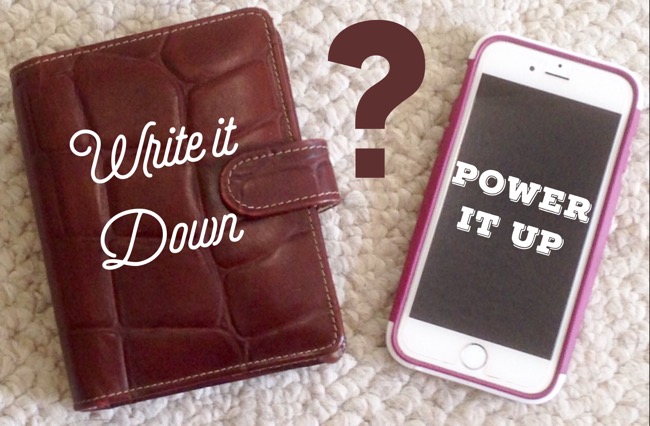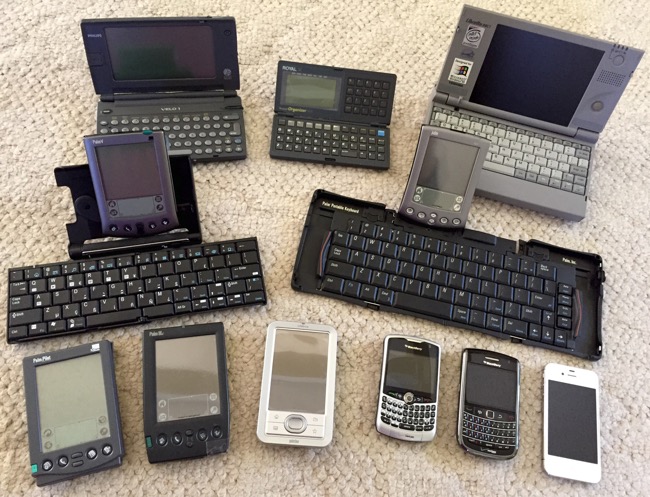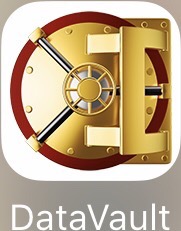Welcome back for another installment of Write it Down or Power it Up where I review something we typically track to see if —in my opinion—it’s best suited to be managed on paper or using technology. This week’s topic is keeping track of passwords. In this digital age where almost every aspect of our lives involves technology, the number of passwords we need to keep track of in our personal, professional, and/or academic lives has greatly increased. So which is the best—and safest—way to keep track of your passwords?

Over the past few years as custom inserts have become more and more popular, I was surprised to see many designers offering ‘Password Lists’. Many might think nothing of it and given how polarizing this topic can be, many might not agree with me. There are many users who prefer to keep password lists in their planner, either in a planner kept at home or in an ‘everyday carry’. For those who take their lists with them, they use various techniques in an effort to protect their passwords like keeping a ‘coded’ list—a list which doesn’t include the actual password, only the keyword ‘hints’ they claim only they would understand—and others store them in a hidden pocket or embed them between pages to make these lists harder to find in the event their planner is misplaced, lost, or stolen. While I find all these tips fascinating, I also find them concerning. Let me explain.
Write it Down?
I’ve worked as an IT Professional for over 20 years in various supporting roles and I can’t tell you how many times over the years I’ve found user passwords on post-its or paper that were left out in the open in offices, around workstations, in drawers, or written in notebooks left open on a desk. Next let’s talk about the 3 techniques mentioned above that many users argue are a good strategy:
- Planner stays at home: unless you keep it locked up in a safe, all the time, anything can happen. It can be seen by someone in your family, a visitor in your home, by someone you hired to do work in your apartment/house, damaged in a fire, stolen during a robbery, etc. Our homes are our safe havens and where we naturally leave our guard down so it’s very easy to forget that we’ve left out such sensitive information out in the open.
- ‘Coded’ password lists: with almost everyone on social media now and depending how much information you share about yourself online (have you ever completed a ’10 Facts About Me!’ tag?), chances are that depending on how well someone knows you, they can probably guess some of the answers to your ‘code’ or find it somewhere online. (This is a common tactic used by hackers to steal your password because they found the answer to your secret question ‘What is your pet’s name?’ or ‘Favorite baseball team? since you probably talk about it or shared pictures about it on Facebook)
- Hide it in a planner pocket: Really?!
- Embed list between pages: See bullet above.
*BTW: Don’t believe me? If you have Netflix or the USA channel thru your cable provider, check out the TV series ‘Mr. Robot’–it will change your life!
My experience has been that users, while well-intentioned, are not always as careful with their passwords—or any sensitive information—on paper hence why companies invest in shredders, hire shredding companies for destroying bulk information, and have employee training on data privacy and security (you should also consider buying a shredder for your home to destroy old bills, financial statements, medical records, expired credit cards, etc.—it’s that important!)

Power it Up?
On the other hand, since the introduction of portable devices, there have always been some form of password app. Managing passwords using a password app not only provides a more covert way of carrying this information but also—depending on the app—might include enhanced supporting features. Password apps usually include features like a separate login (different than the passcode/password used to login to the device), file encryption (to secure your passwords), automatic logoff when switching between apps, and complex password generation tools to help create more complex, and security passwords which might be easier that trying to come up with one yourself. All these features are designed to greatly improve data security. In a world where identity theft is rampant and data breaches are becoming an every day occurrence, you need to be extremely diligent and utilize all the protection you can get!

The Verdict
Throughout my planner journey, I’ve used many paper planners and numerous digital organizers (read more about it here) and throughout that time, I always used my digital organizer and the best password app I could find to manage my passwords. Whether it was on my Palm Pilot, Blackberry, or iPhone, this was—in my personal and professional opinion—the most secure way to carry a myriad of IDs and passwords (for work, I’ve also used electronic security tokens, encrypted thumbdrives, etc.—see a trend?). Now, you might say: “What if your battery died or you lost you device?” For me, that would not be a problem. I would rather suffer the inconvenience of waiting to charge my device or restore from a backup to another device than suffer the major and more catastrophic effect of having my data or identity compromised. Another question someone might ask is: “What if your device was compromised or hacked?” Again, I would be fine knowing that the password app posed as another major obstacle for the perpetrator to overcome since they would have to deal with the additional security layers of trying to get into the app and the encrypted data file. In the meantime, I can focus on resetting passwords, making calls, etc.
So what’s my verdict? In the battle of paper versus digital and whether you should manage passwords by either Writing it down or Powering it Up, I say: Power it Up!!!
*BTW, my favorite password app that I’ve been using for years is DataVault by Ascendo.

What do you use to manage your passwords—paper, device, or both? If you use paper, what are your tips or hacks for effectively and securely managing your password lists? If you use digital, what are some of your favorite password apps to use? Please share in the comments below and don’t forget to like, share, and subscribe!
Until next time, 🙂
♥ LilD ♥
